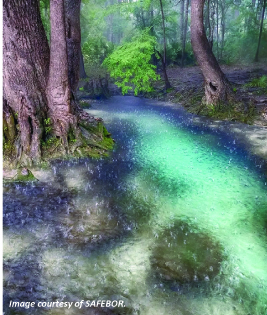Humanities and religion professor Victoria Machado began her presentation about “Sacred Waters” by inviting us to think about water as a character in a story, but not a story about state agencies. The story is about relationships, specifically our relationship to water, not merely as a commodity but as something sacred.
In this story Florida’s most vital natural resource is not a passive character but an active one. It can both heal and need to be healed. Machado cited examples of toxic algae blooms in 2016, 2017, and 2018 that created a State of Emergency. When green slime covered our waterways it not only killed fish but also tourism. This in turn damaged livelihoods. The overwhelming stench created respiratory problems for humans. This harmed both the physical and financial health of Floridians.
In 2014 Florida became the third most populous state in the country behind California and Texas and is growing rapidly. In 2018 Florida rated 10th in the nation for following clean water standards. Some of the largest offenders have been Tropicana, Mosaic Fertilizer, Florida Power & Light and Pilgrims Pride. Contaminated surface water is one problem. Stressing our aquifers by granting generous drilling permits to commercial water bottling companies is another.
To cope with this situation some have turned to prayer as an alternative to protests and petitions. Groups such as the Sacred Water Tribe have held monthly spiritual events which emphasize mindfulness and positive energy forces. The goal is to use the power of consciousness to listen to the winds and the sounds of birds to connect to Nature and help create a clean, loving, and peaceful planet. Author Maseru Emoto explores this concept in his book “Healing Power Of Water.”
In addition various environmental groups have initiated the Rights of Nature Movement. Details are described in the book “Earth Democracy” by Vandana Shiva. These groups holistically align their objectives with the Indigenous world view of Mother Earth as an entity that cares for humans, plants, and animals within her. One of those groups created SAFEBOR, an acronym for the Santa Fe River Bill Of Rights, located in near Gainesville.
Even the United Nations has recommended securing the highest legal protection for nature, citing that nature’s rights are associated with human rights. They report that environmental degradation is advancing around the world. To avoid a major planetary catastrophe the UN suggests acknowledging our need to live in harmony with the natural world.
Making this fundamental shift means thinking beyond ourselves and instead thinking collectively about what water means to all of us. Machado cited Rick Kilby’s book “Florida’s Healing Waters: Gilded Age Mineral Springs, Seaside Resorts, and Health Spas.” He states, “If Florida’s healing waters are to be healed a paradigm shift needs to occur in the very way water is perceived. By changing our relationship we are laying the foundation for larger environmental change.”
Questions to ponder included:
- Can water feel the energy we send toward it?
- Does water heal and change through prayer?
- Will laws be a sufficient way of securing rights for nature?
- If we grant water its legal rights, who will speak for it?
Machado did not provide answers but recommended the writings by environmental journalist Cynthia Barnett as an additional source for exploring the protection of Florida’s fluid landscapes. Sea level rise, drought, and red tide are just a few of the environmental issues for society to confront as we balance the relationship between economic development and population growth while working toward a better tomorrow.
The next Palm Coast Historical Society Speaker Event is entitled “Weeki Wachee: City Of Mermaids” by Lu Vickers happening on May 21. For more details go to www.palmcoasthistory.org or visit our page on Facebook.


